Nicolas Cage National 2 Treasure Book of Secrets Interview
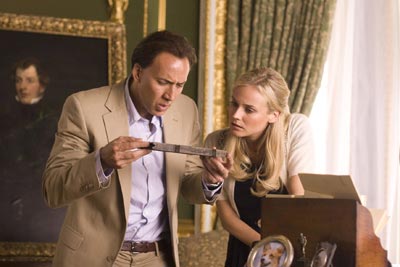
CAGE TREASURES NEW SEQUEL AND WANTS TO DO MORE
by Paul Fischer.Oscar Nicolas Cage has gone his way to avoid doing sequels to his own movies, but three years after National Treasure, Cage's Ben Gates is back, unraveling a mystery that goes back to the Civil War and ends up kidnapping the President. But it's all in the name of family entertainment. He talked to Paul Fischer.
Paul Fischer: What was the criteria for you to sign onto this project? And, what do you think sets this sequel apart from the original film?
Nicolas Cage: You may be aware that I've not done a sequel before, and the reason being that, generally speaking, I never like to repeat myself. In this case, I do believe that, if you're going to do a sequel, it has to promise to be better than the original, or at least as good. Largely, the fear with sequels is that people get lazy. They realize they have a winner, and then they just throw money at it and they don't care. Fortunately, working with John Turteltaub, in particular, he really cares about the story. I wanted to make sure that we could go in a direction that would raise the stakes, and also hopefully be more interesting.
When they first presented the idea of Civil War, Confederate gold, John Wilkes Booth and the Lincoln assassination, right off the bat, for me, personally, that was more interesting, historically. I was excited by that. Then, they said, "We have to rachet it up from stealing the Declaration of Independence, so we thought you should kidnap the President of the United States." And then, I said, "Woah, hold on, new rules. How is Ben Gates going to kidnap the President of the United States?" And, I got nervous. Then, I started thinking about it, and I started laughing, and I realized that that was the joy of it -- that it was funny and it was absurd. When they cast Bruce Greenwood, I realized that there would be a level of believability 'cause he looks Kennedy-esque. And, at the same time, he has a terrific gift for comedy, and he would be able to embrace that Commedia dell'arte, if you will. So, to me, 'Book of Secrets' is like a movie unto itself. When you change the treasure, you change the whole story, and you get new clues that are historically accurate, and you get new locations. Just the actors and the characters stay the same. So, having been a fan of Basil Rathbone and Sherlock Holmes, I thought, "Why not bring Ben Gates back as a modern version, if you will, and archeological version of a detective, looking for [a way to unlock] the mysteries of these treasures?" It seemed wonderfully positive. If John Turteltaub has a genius, it's that he's made movies without a gun that are entertaining, and you can take the whole family. There are worse things to do than to inspire especially the youngsters to look in their history books, so I thought, "Let's go. Let's do it." So, I did it, and I'm happy I did it.
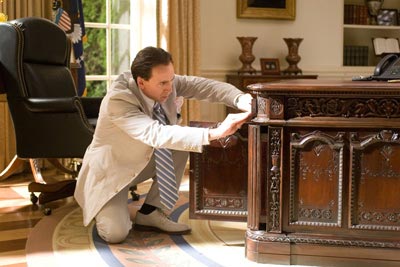 Paul Fischer: What has been your experience having young fans, since the first 'National Treasure'?
Paul Fischer: What has been your experience having young fans, since the first 'National Treasure'?Nicolas Cage: Children, to me, are of the utmost importance. They're really the future, aren't they? So, I want to treat that carefully. I'm one of those people that believes that the power of film is intense, and you have to really think about it, responsibly. In this case, you want them to enjoy themselves with mom and dad, or the whole family, and also get them to look in their history books in a way that isn't, "Oh, you must read, and you must learn." It helps them to enjoy the ride even more because there's a level of believability to it. You wonder, "Wow, why are there missing pages in the Booth diary?" Then, you go see the movie and you can use a little imagination, and it makes the ride more enjoyable. I'm always thinking about the kids, if I make that sort of movie. Even with 'Ghost Rider,' I was thinking about the kids. Walt Disney, for me, is a magnificent hero, of sorts, because he was probably the most influential artist of our time. He was such an influence that we don't even think of him, sometimes, as a human being, but he did this amazing stuff. He took these great classic stories like 'Pinocchio,' and 'Beauty and the Beast' later, and 'Snow White' and made them accessible to children. With 'Ghost Rider,' I was trying to do the one story he never did, probably for obvious reasons, which was Faust. I wanted to make that something where kids could go, "Well, yeah, this is really just a myth." We're all going to get in trouble, so how do you get past that? So, I was thinking about them there too.
Paul Fischer: Did you want to do something new with the character, since this is the first time you've played the same character a second time?
Nicolas Cage: My first question to Jerry Bruckheimer was, "It's been three years. I'm not the same guy. How am I going to go back and do Ben Gates?" And, he said, "That's it. The character has changed." And, the response I got at Disney was that I seem lighter and I'm smiling more and I'm happier. I think the weight has been taken off of the character. He's been accepted academically. He's not considered a wacko anymore, like he was in the first movie. And so, he feels happier.
Paul Fischer: Are you more prepared now, for doing a sequel for 'Ghost Rider'?
Nicolas Cage: All they have to do is call, and I would love to see that happen. That would be fun.
Paul Fischer: So, you're more prone to sequels now?
Nicolas: If I think there's room to grow with the character, and if you can make it better than the original, absolutely.
Paul Fischer: With that being said, would you mind doing a third 'National Treasure,' if all of the elements are right?
Nicolas Cage: With 'National Treasure,' I believe that it should become more and more 'International Treasure.' I was very happy to see that we went to London, England and Paris, France, but I'd like to see the movie go wider still. I'd like to go into Africa, Egypt, Asia, and keep going. My hope is that Ben is recruited and he gets a dossier from these other countries about their history, and has to download it and learn it, and then try to go on these hunts on their behalf. That would be a lot of fun for me.
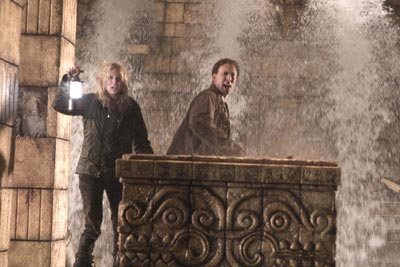 Paul Fischer: How are you like Benjamin Gates?
Paul Fischer: How are you like Benjamin Gates?Nicolas Cage: One of the things that comes to mind is ancestors. In a lot of so-called primitive cultures, there is a tremendous respect for our ancestors that we don't see as much, for whatever the reason, in modern American culture. With Ben, I wanted to make it clear that, probably because his grandfather, Christopher Plummer, knighted him at such an early age, he took it to heart and really believes, in a chivalrous way, that everything he is, is on account of his ancestors. They're not dead to him. They're still there with him and he's honoring them, and I like that about him. I try to embrace that in my own life. And, also, history. Because of playing Ben Gates, I really appreciate history now, and I also enjoy being in places where I feel the weight of past events. I like old architecture and old buildings, and if you use a little imagination, you can time travel.
Paul Fischer: You mentioned that you've changed in the last three years, since the first film. How have you changed? And, in particular, what's it like to be changing diapers again?
Nicolas Cage: [Laughs] It's very natural. You don't really think about it. I think the main changes are that my priorities have improved. I started acting at a very young age, and I had interests which I won't say are wrong, but I'm maturing. Motorcycles, and things like that, aren't has important as they once were to me. And, I like a good book, and I like being in nature or on the water, and being with my family. I think those are just the real treasures.
Paul Fischer: Now that your uncle, Francis Ford Coppola, is making movies again, will you work together?
Nicolas Cage: Last time I worked with Uncle Francis was 'Peggy Sue Got Married,' and I was really happy with that.
Paul Fischer: That was 20 years ago.
Nicolas: Yeah. It's been a long time. If he called, I would certainly like to work with him. And, I'm happy to see that he's behind the camera again. I wrote him an email recently, saying "The world needs more of your movies." So, I'm excited to see what he does.
Paul Fischer: Any place specific you'd like to take Ben Gates in another film? Do you get input into where the next film will take place?
Nicolas Cage: Personally, my interests are ancient history and ancient civilizations. In my own life, I'd like to go to places like ??? [can't understand the location he says] or Easter Island. It would be fascinating to see Ben also go to those places as well, and how they could all tie together somehow. The way we left the movie, the President asked Ben, "What's on page 47?" I wanted to figure out what I could say that would really make people interested in what's on page 47 without saying it, so I thought of the words "life altering." Whatever it is, it's going to have to be life-altering.
Paul Fischer: Would you want to live in Easter Island or ??? [same location again]?
Nicolas Cage: No, I wouldn't want to live there. No. Maybe later, but not right now.
Paul Fischer: In the movie, Ben implies that, because of the office of the presidency, he admires the man. Do you think that is an old-fashioned value that has no place in today's society?
Nicolas Cage: I think one of the things that comes out in that moment is that Ben is really speaking what we all want to believe. In a way, he's charging the President in that moment, saying "You took this office, so this is the oath. Are you going to perform or not?" That's how I saw that.
Paul Fischer: Were there any conversations, at the time you were filming, to make sure you kept the film from veering into current events?
Nicolas Cage: That scene with the President was always the concern, from day one, even before principal photography. I kept going over it and over it and over it, in my room, up late at night. I would look at it, I would rewrite it, I would tinker with it. I would send the pages back to the Powers That Be at Bruckheimer Films, and then, they would fact check them, or go through it with their writers and come back. We kept tweaking it. So, I realized the importance of that scene, not lapsing into something overtly political or sentimental or maudlin, but try to get to the root and the simplicity of it. It always became clear to me that it was an overture to the President to step up. Whatever there is about politics, and we all know that lying is endemic to politics, we used what is good and what was meant to be and what we want to believe to be the overture.
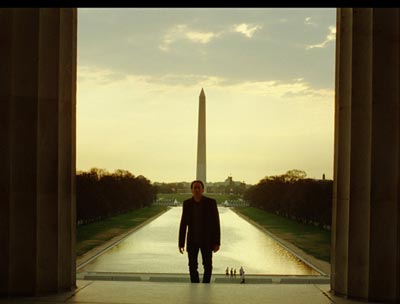 Paul Fischer: Has there already been talk about a third film? And, if so, has there been any interest in Mayan, Aztec or Incan civilizations?
Paul Fischer: Has there already been talk about a third film? And, if so, has there been any interest in Mayan, Aztec or Incan civilizations?Nicolas Cage: Yeah, absolutely. In this case, with 'Book of Secrets,' we got into ??? [can't understand this civilization] and Zapotec. My personal interest, if you go to Belize and you see pyramids, is that they were apparently doing brain surgery, if you look at some of the skulls. That, to me, is remarkable and really interesting. How did they know to do that? What were they doing with it? And, did it work? It's quite fascinating. That would be something, but that's a different movie, I think.
Paul Fischer: Can you relate to Ben's connection to his ancestors, as far as your acting career?
Nicolas Cage: Well, I do relate to that. I think so. I feel that it began with Carmine Coppola. We didn't come from money. He came here because he could play the flute and he joined Toscanini no less, Toscanini's orchestra and was the first chair flutist. The most beautiful thing that happened, just as a side track to that, but about two years ago I was sleeping. The TV was on, it was the arts channel, I didn't know and I heard this flute and I woke up. It was my grandfather playing the flute and it was the Dance of the Blessed Spirits. I'm getting chills thinking about it. It was like he was talking to me. It was amazing. He was the beginning of our history in the arts and then he married a Pennino, my grandmother's family who was writing songs and she was a composer. Then from there, it just kept going. Francis and Sofia and Tali and everybody.
Paul Fischer: Are you comfortable advocating questioning authority in a movie?
Nicolas Cage: I believe that there's a way to question authority with manners, with dignity. There's no reason to be rude about it. You can still say, "I want some clarity here." I don't want to get political, as I said, but yeah, the Book of Secrets, I don't know. It's an urban myth but I'm sure there are tons of things that are classified that we're not supposed to know for whatever the reason that we'd probably like some answers on, sure.
Paul Fischer: How is it being involved in the Police documentary as a producer?
Nicolas Cage: Well, my partner, Norm Golightly at Saturn films is an enormous police fan. [Phone rings]. I beg your pardon, I thought I'd shut it off. It's actually my wife but I will get back to her.
Paul Fischer: Take it.
Nicolas Cage: No, I know you want to hear me talk.
Paul Fischer: So the Police documentary.
Nicolas Cage: Well, the Police interestingly enough have always had a part of my life, professionally as well as just as a young man growing up. When I first heard Sting's voice, I was in Napa Valley living with my uncle. It was the most unusual sounding voice. I almost thought he was chicano or something, the way he used his voice. It sounded like that and I was very curious. I liked the music right off the bat. Then I made Rumble Fish and Stewart Copeland was the composer, the drummer of the Police. I thought it was the best soundtrack of a movie I'd ever heard, outside of Nina Rota. I loved his music and then when I did Leaving Las Vegas, the first sound you hear is Sting. So it seemed like a good match. Now they're back and I think they're a very important band and one of the bands that kind of lent a soundtrack of a great portion of my life. That's why I got involved with that.
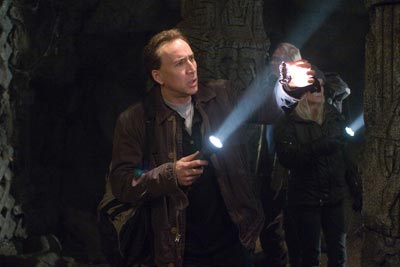 Paul Fischer: How has being a parent invigorated your passion to do programming for kids, and how did new fatherhood change your perspective on your work?
Paul Fischer: How has being a parent invigorated your passion to do programming for kids, and how did new fatherhood change your perspective on your work?Nicolas Cage: Children, especially from one to six, are so impressionable. The main priority is just make sure they're happy as much as possible. That's the job, make them as happy as you can possibly make them in my opinion, because we know as they get older, things start happening. There's pressures and there are hormones and all of that, so in the beginning you want it to be just how happy can you keep them for that wonderful, magical period of time? That means movies that are positive. He loves Yellow Submarine and he likes the Beatles and that music and the Wiggles and all that. That's great. There's plenty of time to discover the other stuff and I'm sure he will if he's like all the rest of us in my family. But in terms of choices, I try to make movies that will hopefully do some good for the whole family that way.
Paul Fischer: What are the Cage family Christmas traditions?
Nicolas Cage: This year I'm going to do something new. I'm going to have a Dickens Christmas. I'm going to take everyone to England. I've never done that. I'm going to just walk around Bath and see how they celebrate the holidays because I've always fantasized about that.
Paul Fischer: The best Christmas gift?
Nicolas Cage: Hands down the best Christmas present I ever got, because it was a tool to stimulate my imagination, my father was in Italy. He was on sabbatical and I had a little toy car that was being driven by Pinocchio. For whatever the reason, Pinocchio's head fell off the day before Christmas. I played with it a little too roughly. My father picked up the head and he went into the garden and he planted it. I thought, "Why are you doing that?" The next morning was this enormous thing that had grown in the garden. I ripped it open and it was a giant wooden Pinocchio. I was scratching my head trying to figure out how that grew. And then I started planting everything. I planted all my Hot Wheels. I had a little G.I. Joe slipper. I thought if I planted that, it would grow really big and I could put my sleeping bag in it. So he really got me thinking in an imaginative way at a young age.
Paul Fischer: Working with Helen Mirren and Ed Harris?
Nicolas Cage: Helen Mirren is someone that I have really admired ever since I saw her in Excalibur. That was the first thing I said to her. "I loved you as Morgan Le Fay." One of my most powerful crushes was Helen Mirren as Morgan Le Fay. She's really down to earth. I have to tip my had to her that she would win the Oscar in The Queen and then go and in the grand spirit of Douglas Fairbanks or Errol Flynn go make an adventure film. To me, that shows a lot of spirit and a great zest for life and that she's willing to do that, jump around and wear the wire and all that. I love her for that. And she's funny. Within two minutes, she puts you at ease. She doesn't take herself too seriously and she makes you relaxed and you have a lot of great laughs together. I would love to work with her on every movie. Ed Harris I had the pleasure of working with on The Rock but we didn't have too many scenes together. He's one of those actors that's brutally real on film and you can't help but be blown away by his talent because of that. You look at his performance as Pollack or any number of his performances with the one he just did recently with David Cronenberg. He's always got this gravitas and this weight to him that is compelling. So when they said he was in the movie in the grand spirit of Jerry, he always casts the best actors, I knew we had the possibility of making something very, very exciting.
Paul Fischer: Why Bath?
Nicolas Cage: Because when I'm in Bath I feel like I'm walking around a snow globe. I'm in this contained, beautiful historic universe. Everybody's really, really nice and I don't need to use a car and I can walk. The architecture is magnificent and it's like we talked about earlier, I feel that I'm in touch with the past and world events and that history. As I said, with a little imagination, I feel like I'm time traveling. I'm going to these other places and I'm learning something. It's helping me grow.
Paul Fischer: What about the people there?
Nicolas Cage: I like the people there. The people are very friendly. I'm always excited to meet people and say, "Are you Bathonian?" "Why yes, I am."
Paul Fischer: Will you have a Christmas goose?
Nicolas Cage: I'm going to try to have a Christmas goose, absolutely.
Paul Fischer: What was the most challenging scene in this movie?
NC: Well, the most challenging sequence hands down was the platform, the balancing platform sequence because it was a mathematical, physical conundrum to act. I had to try to keep in my head what happens in terms of leverage and physics if you step here and he goes up there or she goes down there. It just was a mess. It actually had to be reshot once or twice to get it to make sense for all of us. So that would be the sequence that comes to mind as the most challenging.
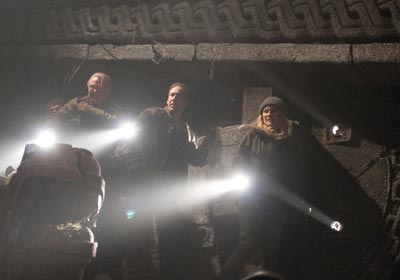 Paul Fischer: How long did it take to shoot?
Paul Fischer: How long did it take to shoot?Nicolas Cage: That particular sequence I recall being at least three weeks.
Paul Fischer: Speaking of bands, how important is an ensemble cast in your movies?
Nicolas Cage: Well, I think it's a bit different in that on a movie, you have a lot of referees. In this case, everyone got along very well and it is an ensemble cast and it is something that it's a connection of playing off of one another and we've all grown to recall these characters and identify with them. But you don't have to write the music together necessarily. Sometimes you do but with a band, I think you can see why there's a lot of bands that break up or there's hardships because egos can get in the way Who's the leader or who isn't or who gets to get that song on the album or doesn't or who gets to have a guitar riff or doesn't. And you're on tour together so you're stuck on a bus for many, many days out of the year. That's a hard life to stay friendly and on good terms.
Paul Fischer: Is the writer's strike affecting your work schedule?
Nicolas Cage: I don't have any definite immediate work plans at this moment that I would be able to speak with certainty about, so I'm wide open as far as that goes until I'm ready to go public with something. In terms of the writing strike, I'm not a patented writer or in the guild. If I had something that I was involved with, it wouldn't really affect me being that I'm not a writer.
Paul Fischer: But production is being stalled.
Nicolas Cage: Well, it's made everything upside down in Hollywood. To answer your question, yeah. It's difficult because some movies can't get off the ground because they need to be tweaked, but I haven't had that experience yet personally.
Paul Fischer: So the Pang brothers film is done?
Nicolas Cage: Yeah, the Pang Brothers film is finished but it's looking for a release. I like that movie but I don't think it's the sort of movie that's necessarily comfortable for studios or even American audiences for that matter. It's an edgy film. It deals with an interracial relationship and it has difficult subject matter but the Pang Brothers I think are gifted. The people that I consider my friends whose opinions I trust that I've shown the picture to think it's one of the best things I've done since The Weather Man, so they really like it. But who knows what's going to happen with that movie.
Paul Fischer: What's it called?
Nicolas Cage: It's called Bangkok Dangerous. It's the weirdest movie I've ever made and I like that.
Paul Fischer: Having a coup in the middle of it probably increased the weirdness.
Nicolas Cage: Yeah, it did actually. That was a bizarre experience. That's another matter but that was very strange. I like seeing cultures trying to communicate and trying to understand one another. I think it makes for interesting subject matter and that's why I made that movie.
Paul Fischer: If you could do any historical mystery in any country, what would it be?
Nicolas Cage: To see Ben Gates try to solve? Jerry Bruckheimer already did a movie on Arthur but I would like to see him go back into those areas and domains and try to really locate the actual person behind Merlin or the actual historical person behind Arthur and really look at that. I'm one of those people that believes with every myth, there is a kernel of truth so I'd be curious to see how that could relate.
Paul Fischer: What is it about working with Jerry?
Nicolas Cage: I think if you look at his logo, it's in the logo. He's always trying to capture lightning in a bottle or freeze lightning. He gets actors together whom he trusts and keeps you in a state of I call it a high wire state or no net productions where you never really know what the dialogue's going to be until the last minute. That's enormously frustrating. At the same time it give you spontaneity and a buzz where everyone's charging and electric together. Then he captures it. I think the thought process is if it doesn't work, he'll do it again or he'll get more writers and he'll keep doing it until he gets it to work. But what is captured is a spontaneity or an energy which is a lot of fun to watch. I think that's why we keep working together, because I know he'll give me great actors like Helen Mirren and Ed Harris and he cares about the product.
Paul Fischer: What about Voight?
Nicolas Cage: I always said if you're going to cast someone to play my father, cast the greatest actor in the world. When they said, "Well, how about Jon Voight?" I said, "That'll work for me." So I'm very happy about that.
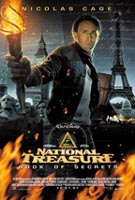
National Treasure Book of Secrets
,b>Starring: Nicolas Cage, Diane Kruger, Harvey Keitel, Ed Harris, Jon Voight, Justin Bartha, Helen Mirren, Bruce GreenwoodDirector: Jon Turteltaub
In this follow up to the box-office hit "National Treasure," treasure hunter Ben Gates (Nicolas Cage) once again sets out on an exhilarating, action-packed new global quest to unearth hidden history and treasures.
When a missing page from the diary of John Wilkes Booth surfaces, Ben's great-great grandfather is suddenly implicated as a key conspirator in Abraham Lincoln's death. Determined to prove his ancestor's innocence, Ben follows an international chain of clues that takes him on a chase from Paris to London and ultimately back to America. This journey leads Ben and his crew not only to surprising revelations - but to the trail of the world's most treasured secrets.
National Treasure out on DVD
Order Now from Chaos
Order Now from Sanity
MORE
- Viggo Mortensen The Road
- 24 Cast Reunion
- Aaron Eckhardt No Reservations
- Aaron Eckhart The Dark Knight
- Adam McKay Step Brothers Interview
- Alan Alda Diminished Capacity Interview
- Alan Alda Diminished Capacity Interview
- Alex Dimitriades
- Al Pacino Oceans 13
- Alan Rickman Snow Cake
- Alan Rickman Sweeney Todd



